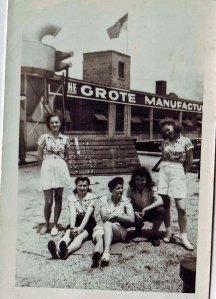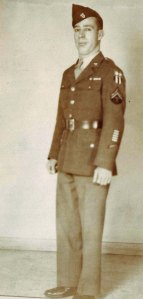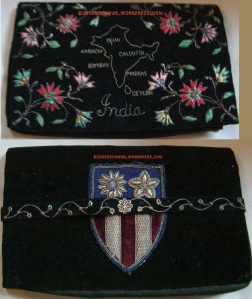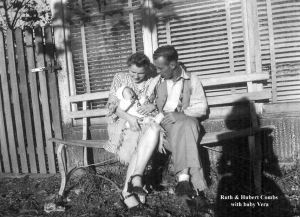In 1944 Ruth Racke left Claryville,Kentucky. She went north to Covington, a city on the Kentucky side of the Ohio River, and lived there with her sister and her sister’s two kids while her brother- in- law was off at war. Ruth was eighteen, a sensible and responsible brunette with brown eyes, who just had finished high school. Her father ran the general store and gas station in Claryville, her mother raised chickens with five boys and five girls on the family farm. Ruth might have stayed with her family in Claryville, if not for the war. The war had split her family apart, with four of her five brothers and a sister overseas with the Army and Navy.

Ruth Racke (second from left) and Norma Combs (second from right) at Grote Manufacturing in 1944. (Photo courtesy of Vera Hypes)
In Covington, Ruth worked at Grote Manufacturing, painting the tail fins of bombs. At Grote, Ruth met other girls, girls who had come from different cities and towns across the state and America. She met Norma Combs, a girl who grew up poor in the countryside of Carollton, Kentucky. They complimented each other, each being what the other was not. Ruth was thoughtful and practical, Norma was impulsive with a wild streak. Norma’s mother had died when Norma was young. Her father was abusive and had worked off and on for the railroad until his kids were old enough to work for him and he could stay home. Norma had a brother too, his name was Hubert but she called him “Red” because everyone else did. Red left school after the eighth grade to work in construction, earning money to support the family because his father wouldn’t. He was drafted a month after Pearl Harbor and had been overseas since 1942 when he was sent to Australia. Now he was somewhere in the China-Burma-India Theater. She had a picture of him, he was handsome in his uniform with a look of quiet, amused confidence. He didn’t have a girl to send him mail other than his sister, and Norma wondered if Ruth would write him.
Ruth and Red began a correspondence, friendly notes between people who never met and did not know much about each other. Ruth wrote him things about her life and Red’s sister, mundane things about work and her thoughts and feelings. Ordinary things that brought the touch of home and femininity that mean so much to a man. Red wrote Ruth of his life in India, of his travels from Assam to Bengal to New Delhi. He wrote about the bugs that crawled into the dough and got baked in the bread and the wild monkeys that sat on his shoulders in the cafes. He saw the Ganges river, where people bathed and drank the water as dead bodies floated by. Red saw the kindness of the Indian people and learned of Ghandi, a man he came to admire.
He wrote other things to Ruth. He told her how much her letters meant to him. How much he enjoyed hearing from her and of his plans for the future. If Ruth had known Red when he left Kentucky, she would have seen a man from a poor and broken home with little education; a man beat down physically and emotionally by his father; a man who saw no way to pull himself up.
But in India, Red saw people from poverty worse than his. It gave him perspective on his situation and helped him realize the opportunities that were awaiting him in the U.S.A. By 1944 Red was a confident man. He had been commended by his commanding officer out of hundreds of others for his military appearance and bearing. He was a radio operator, trusted with valuable machinery, and charged with important communication duties. For the first time in his life, Red felt valued and gained a sense of self worth.
He began to send Ruth things: handkerchiefs, aprons, hosiery bags and a gold laced purse with the map of India on it. Small things he could imagine her being beautiful with. As Red’s time overseas came to a close he wrote her “I can’t give you the world, but I’ll work hard and do the best I can to make a good life for you.”
Red came back to the U.S.A. in January 1945. Ruth met him as he stopped in Kentucky before being sent to an Infantry Training Battalion in Arkansas. Their life returned to what it was, separated but connected by letters. But things had changed since they met and there was future that was waiting for them. World War II ended on September 2nd 1945 and there was no more need for painting bombs or training soldiers. On September 24th 1945 Ruth Racke and Red Combs married in Little Rock, Arkansas. A month later Red was discharged from the U.S. Army and went home to Kentucky with his wife.
The two eventually settled down in the city of Independence. They had their only child, Vera in July 1946 and raised her to respect people of all races, religions and backgrounds. Red opened his own construction business and Ruth became a housewife. They were well known in the church and became active in the community. As the years went by the only reminder of the war that brought them together was a book about India Vera flipped through as a child. Even the gifts Red sent Ruth from overseas were put away in boxes. The two didn’t talk much about the war and the part they played in it. They didn’t see the need to dwell on the past. Ruth and Red Combs were more interested in their future, busy living the rest of their lives together as a family, in peace.



Another beautifully written and compelling vignette of WW2. can’t wait for the next ine.
Uncle Doc
Sent via the FORCE
Thanks for the comment, glad you enjoyed it. Will hopefully get more up soon!
Great story. Thanks for sharing